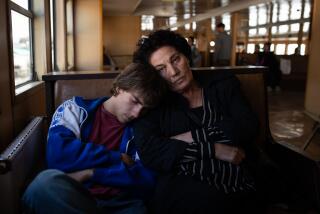Showing Prostitution With a Human Face
- Share via
ISTANBUL, Turkey — They have long been reviled as disease-spreading interlopers who arrive by the thousands each year from the former Soviet Union and rob Turkish women of their husbands, if only for one night. But a new Turkish movie has put a human face on the infamous prostitutes known as the Natashas.
The Turkish-produced film “Balalayka” features a cast of Russian actresses portraying women forced into prostitution during the economic meltdown of the post-Soviet era. Since opening in January, it has been a box office hit by Turkish standards, with more than 650,000 tickets sold across the country.
It has also challenged some popular assumptions. “Until I saw ‘Balalayka,’ I thought all Russian women were prostitutes and wanted to be prostitutes,” said Mehmet Acar, who runs a cafe on Istanbul’s Taksim Square. “Now I feel ashamed.”
One of the characters is a theater actress, another an opera singer and a third a ballet dancer. Each has a story about the hardships of feeding a family or paying for treatment for a sick relative in Russia.
“I was paying the Russian actresses $30 per month, and believe me, they are top class,” director Ali Ozgenturk said at the headquarters of his production company, Asya Film. “Doesn’t that explain everything?”
Gani Yildirim, deputy chief of law and order in Ankara, the capital, has seen “Balalayka” and says it “reflects the tragic reality” on the streets of Turkey’s cities.
According to police, the number of foreign women arrested for prostitution rose from 1,020 in 1999 to 1,375 last year. Many were from Russia and Ukraine, but the majority were from Georgia and Azerbaijan.
Criminal gangs run by Russian and Turkish men dominate the trade. But prostitution rings, Yildirim said, are almost impossible to bust because “none of the women are willing to talk. They know they would be killed.”
Tanya, the lead character in Ozgenturk’s film, gives these women a voice--before her Turkish pimp shoots her dead on screen. The pimp is angry because Tanya refused to let him sell Olga, her teenage--and presumably untouched--niece, who accompanied her to Istanbul.
Many prostitutes ply their trade in seedy hotels in Istanbul’s commercial Laleli district. Until recently, Laleli was also a favored destination for Russian and other Eastern European “suitcase traders,” who bought cheap clothing and leather goods here to sell back home.
Lower prices in China have lured away many of the suitcase traders, and Laleli’s once-brimming stores are all but empty. But shopkeepers in Laleli say some women traders stopped coming to Turkey after being treated as if they were prostitutes.
“Any woman who looked Russian would be harassed and called Natasha by the men here,” said Ruslan Aymatov, a Russian who interrupted his university studies in Moscow to work as a translator for a leather trader in Laleli. According to Ahmet Ocak, another leather salesman, many Russian women get turned away by Turkish immigration officials “just because of the way they look.”
Turkey’s sensationalist press has reinforced the stereotype. Before they were banned by an Interior Ministry decree last month, pictures of foreign prostitutes being led away by police, captioned “Natashas,” were featured prominently in newspapers. The press, and even some Turkish officials, have blamed the women for the rising incidence of AIDS in Turkey.
Some studies show that Turkish men in rural areas rarely use condoms and often pass sexually transmitted diseases to their wives. In Turkey’s religiously conservative Black Sea provinces, Islamic clerics caution their male congregants against “the evil foreigners” during weekly sermons in rural mosques, according to Turkish media reports.
Director Ozgenturk sees the Natashas’ impact differently. He argues that they have educated “thousands of Turkish men in the art of lovemaking in a society where it is considered shameful--especially for any self-respecting virtuous woman--to enjoy sex.”
“Through my film,” he said, “I have tried to hand back these lovely women the dignity and respect they rightfully deserve.”
More to Read
Only good movies
Get the Indie Focus newsletter, Mark Olsen's weekly guide to the world of cinema.
You may occasionally receive promotional content from the Los Angeles Times.










